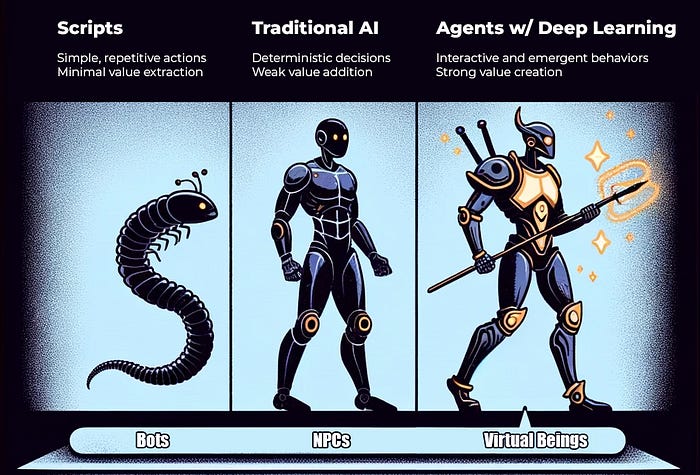As you may have seen, I’m a bit fed up with the current meta of announcing token airdrops to NFT holders for games long before they are launch. On top comes that tokenomics details are usually lacking. But as long as token goes up, no one is complaining. The more projects do this however, the more attention is diluted.
Given the short attention spans and the highly speculative logic of this practice, I see this meta to be replaced by Play to Airdrop in 2024. The benefit for games is that they increase their player count which can help to get grants from L1s/L2s/L3s looking to juice their numbers, or receive VC investments. I shared my thoughts about Play to Airdrop design here.
With that out of the way, let’s get to this week’s topics
The Attention Economy of Games
Autonomous AI Agents in Games, a use case at the intersection of AI, gaming, and crypto
The Attention Economy of Games 🔗
While business models of video games have changed over time, from arcades to premium console games , or free-to-play, all of them have one thing in common: The key is to catch players’ attention. Leisure time is limited and players have to decide which game to play - or which show to watch, podcast to listen to, friends to meet, or shitcoins to ape.
The current meta are live games. They are masters at capturing attention. Publishers need to get users in once and feed them new content to keep them engaged. That provides a better ROI than having to blast new marketing to make players switch to a new game. Sequels are another way of leveraging attention created previously, captured in the form of brand recognition.
Observing games through the lens of scarce attention also provides a new angle on target groups. For example, co-op multiplayer that replaces other date-night activities like watching Netflix.
There’s an endless player funnel from awareness to acquisition, engagement, re-engagement, and monetization. Ceteris paribus, the more people come in, the better. And even better when they come in for cheap and stay because something has become a phenomenon everyone is talking about. That’s why attention matters.
Autonomous Virtual Beings 🔗
Thesis: AIs can own themselves
Why: When AIs are not owned by anyone, they become this neutral party that we can interact with in games, for example by playing with or against them, by investing in them, or letting them build worlds. AIs become beings, blurring the lines between real and virtual. That creates richer esperiences, emergent behavior. For example, developers no longer program the NPC’s AI, the NPCs are on one level with players, making their own decisions and having the same power to change their environment.
How: ERC-6551 Tokenbound Accounts allow AI agents represented by NFTs to hold their own assets (NFTs & fungible tokens)
What: AI agents as autonomous virtual beings that own their own data & assets and can act freely. We may even expect AIs to form a society where all take on different roles.
Where: Games can act as an artificial evolution lab for autonomous virtual agents. As AIs compete in-game, it’ll become clear which AI models are performing better.






I love the diagram here.
There's a weird dynamic - what is the distinction between a game-linked virtual being vs. a market-maker owned trading bot. In my mind, if an AI can be "profitable" in terms of how they acquire their own assets, they will be utilized by centralized entities. Two areas remain:
1) "unprofitable" AIs, e.g., asset collectors & curators or narrative builders
2) profitable AIs that evolve to be profitable when they are already autonomous.
Curious if you've got thoughts on this?